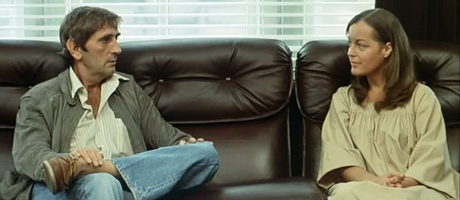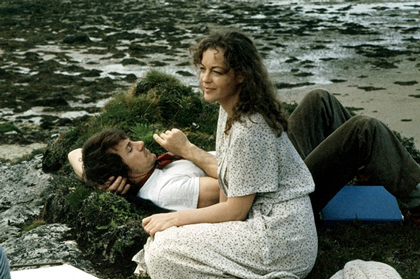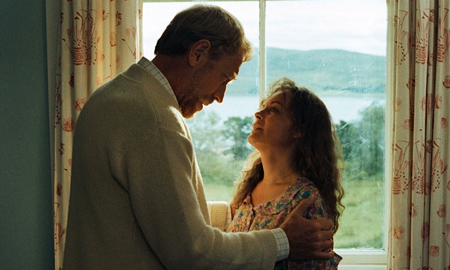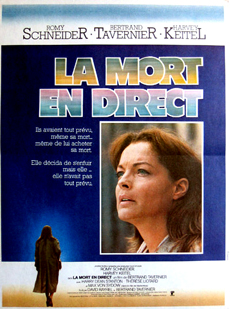
 |
|
|
|
Not very much has been written in English about Bertrand Tavernier's Death Watch, although I contributed about 10,000 words to the cause ten years ago in a pair of articles about the Wim Wenders epic Until the End of the World. Adapted from a 1973 novel by David Compton called The Continuous Katherine Mortenhoe or The Unsleeping Eye, for prophetic science fiction Death Watch is up there with fine work like Gattaca and Children of Men. I highly recommend it. 
Where do I start? Death Watch takes on some major themes of the modern age but really nails the pernicious influence of Reality TV and the way the ability to "see it live" negates the value of actually living. With his great cast Tavernier might have thought he had a potential crossover hit, but the downbeat title can't be seen as a good commercial choice. The original La mort in direct translates as "Death, Live" as in, 'live on TV, see it now.' Although Tavernier's film is about the idea of living a fulfilled life, free of outside control, its cerebral approach doesn't spell blockbuster business. The movie takes place in Glasgow, in a near future where a stagnant economy hasn't brought down society, yet has made it less liveable for the poor while technology separates the haves from the have-nots. Advanced medicine has found the key to curing every disease, so that very few people die of maladies. Old-age homes are packed healthy, if senile, old people. Perceiving that the jaded public would be fascinated to watch people dying the old way, NTV television executive Vincent Ferriman (Harry Dean Stanton) has devised a popular show, "Deathwatch", which documents the agony of the rare individuals that manage to contract a fatal disease. For his next subject Vincent finds Katherine Mortenhoe (Romy Schneider), a writer of computer books. She refuses to sign a contract until the unwanted media onslaught wears her down. In an act of rebellion, she takes Vincent's moneybut reneges on the deal, fleeing in disguise across the countryside. But Vincent has a fantastic trick up his sleeve. Former NTV cameraman Roddy (Harvey Keitel) has had a miniaturized TV camera implanted in his eye. He attaches himself to Katherine in her flight across Scotland, transmitting back to the NTV studio a perfect cinema-vérité flow of images and sound, recording every bit of Katherine's ordeal as it happens. Katherine clutches her privacy around her -- it's her last possession. She thinks she has escaped Vincent, and thus has retained her dignity. Her goal is to walk and hitchhike westward to Land's End, to the home of her ex-husband Gerald Mortenhoe (Max von Sydow). Then something tragic happens to Roddy's spy-eye. If he wants his show to provide an ending for his millions of viewers, Vincent Ferriman must scramble to re-contact Katherine. Equally concerned is Tracey, Roddy's own estranged wife (Théresè Liotard), who was always wary of Vincent's manipulative, "the show must go on" attitude. Katherine reaches Land's End, but by that time her own attitude has undergone radical changes. 
At one point Katherine voices her distaste for Vincent Ferriman's view of television: "You think that everything is interesting but nothing matters." In 1980, the concept of Reality TV was limited to experiments like An American Family, a PBS miniseries in which a family allowed camera crews to follow their daily lives. The idea intrigued film students and McLuhanites, but it was folly on a wide scale. Because the presence of a camera alters everything, the idea that 16mm film crews could follow a family around for weeks and record "the truth" is absurd. "Pay no attention to us, just keep talking normally!" Now, of course, Reality TV shows pretend to present real contests, real confrontations and real interpersonal interaction, when it's all just as fake as ever. Even if the producers don't influence the "plot" (and of course they must), the chosen participants are extroverts secretly hoping that they'll be discovered as actor-personalities, and thus "act naturally" as if their lives depend on it. The only possible Reality Show would be morally questionable, a voyeuristic intrusion by unseen cameras into personal privacy. In Death Watch Vincent Ferriman assumes the right to invade anyone's privacy with the self-serving rationalization that what he is doing is serving some definition of the public good. He's also running a business and accustomed to getting his way. When Katherine won't volunteer to be a guinea pig for his death show, he tries to sway her with money, and then opts to simply fool her. Roddy's cyborg eye is just the kind of physical customization that is bound to become more frequent in the 21st century, when future generations may be implanted with cerebrum communicators to facilitate cell phones and internet access without bothersome personal electronic devices. Roddy has had his own eyes blinded and is now a walking TV unit. The only hitch is that his robo-eye will go dead in a few minutes if it's ever kept in total darkness. Spy movies and paranoid conspiracy movies once doted on the idea of monitoring people with voyeuristic cameras ... now we use them to watch our babies and give out traffic tickets. Death Watch is the first film that really probes the consequences of ubiquitous video abuse since Fritz Lang's still-revelatory The 1,000 Eyes of Dr. Mabuse. Roddy must also keep Katherine away from televisions, as her show is being watched everywhere, all day long (not unlike Paul Bartel's The Secret Cinema). Roddy dutifully transmits to Ferriman precious, intimate scenes of Katherine baring her soul to him, thinking that she's speaking in private. The masses enthralled by Katherine's story are bound together in a mass emotional equation. We see it all the time today in lesser degrees -- people so wrapped up in their sports shows, their miniseries, their performance audition shows, that it seems they have surrendered active parts of their lives to passively watching a manufactured substitute for real life itself. Vincent Ferriman carefully monitors the diet of programming, stressing new angles to tailor "Deathwatch" to what the mass viewer wants to see. People have sold their souls, and sacrificed themselves, to canned entertainment. 1 
The movie would be insufferably morbid were it not for the spirited, defiant performance of Romy Schneider, a big European star of the 1960s who seems even more beautiful and soulful, even when wearing rags and hiking Westward to an uncertain future. Frustrating the plans of Harry Dean Stanton's scheming Vincent makes Katherine an admirable heroine, as when she fakes a sudden heart attack right after taking his check -- just to show him how HIS plans could suddenly be ruined as well. Katherine faces all of her trials with courage, even though skipping out on her contract makes her a fugitive from justice. Science fiction movies with a human dimension are scarce, and Death Watch is an intense emotional experience. Tavernier tips his hat to prophetic Sci-fi of the past by placing old movie posters in Vincent Ferriman's office -- Roger Corman's X - The Man with the X-Ray Eyes, The Incredible Shrinking Man, etc. We movie buffs pick up on these references without further prodding -- the TV executive is basically a tasteless guy who works in a cheaply decorated office and thinks he's living on the cutting edge of a science fiction future. What he's actually doing is building a parasitic TV empire that exploits human suffering. And the public mostly approves. As with any immoral activity embraced by the public at large, "Deathwatch" debases society. Death Watch is a beautifully scaled production. No futuristic marvels are required. Katherine flees through a giant swap meet, which would seem to be a tolerated non-taxed marketplace caring for the needs of the poor. We see refugees in transit, either because they're illegals or they are the newly-homeless looking for someplace to live. The world is like our own, with many things that someone from 1905 would recognize as unchanged (plumbing, for example) but with things like a computer that writes books. 
In 1996 I heard Wim Wenders explain how this movie and his own science fiction epic Until the End of the World were conceived during a set of discussions between himself and Bertrand Tavernier. The movies share so many parallel situations and physical correspondences that a tight relationship between them is obvious (I work it all out in the Second Half of the Until the End of the World essay, which I expand in my Savant Sci-Fi Reader book) -- the black wig, the pygmies, the "eye invention", Max von Sydow waiting at a remote location. But, since Death Watch was adapted by writer David Rayfiel from a pre-existing book, I'm not so sure that both movies sprung equally from the same discussions. It's a minor matter of curiosity that makes Death Watch and Until the End of the World seem even more tightly related. Robbie Coltrane has a nice bit as a limousine driver. German director Bernhard Wicki plays Katherine's father, who lives in a nursing home, apparently in good health but with a greatly diminished mental capacity. Death Watch says that all diseases have been conquered, but the old folks still succumb to dementia and what looks like Alzheimer's. Shout! Factory's Blu-ray of Death Watch will be a revelation for the few American viewers that have seen the movie only on domestic video, pan-scanned. The transfer is excellent, with delicate shadings in the colorful images. The full Panavision width not only gives us beautiful scenery to enjoy, but it anchors the story much better to its setting. An opening crane shot over a cemetery now makes its own statement, echoing the baleful title tune that assures us that "Katherine Mortenhoe will die". The movie is performed in English, with isolated snatches of dialogue in French and German, (ahem) just like Wenders' film. An added mystery is cleared up as well. My 1990 laser disc was shorter than the official 130 minute running time, and the original Daily Variety review alluded to a different ending. The new Blu-ray is the original full-length European cut that has some very radical plot changes at the finish. (I won't go into them, even in a footnote, as they're real spoilers and few people have seen the movie.) The role of Roddy's wife Tracey is much extended. The reversal at the end certainly shuffles some assumptions we've made all through the film, and I'm not certain that it improves on the chopped-down American cut. This original French cut makes the film seem more of a diabolical conspiracy, and the eleventh-hour development distracts us from the more central themes of Reality TV and Invasion of Privacy.
On a scale of Excellent, Good, Fair, and Poor,
Death Watch Blu-ray rates:
Footnotes:
1. Emotionally lazy viewers also become so mentally porous that they'll soak up whatever you want to sell them, be it entertainment, consumer products, political issues or just plain lies. The relevant truth put across in Death Watch is the post-McLuhan notion that the all-powerful media warps our communal culture more efficiently than can any totalitarian dictatorship. We brainwash ourselves. When it is finally assumed that everybody is selling something, even the news programs, nobody expects to find an unbiased truth on any subject, anywhere. The political media-scape now, a few days before a national election, might as well be Vincent Ferriman's NTV: free speech is for sale to anyone with deep pockets. Our whole culture seems to depend on bombarding the populace with dishonest product pitches and outright falsehoods. At least in the future of Death Watch, health care seems to have scored a triumph. We don't even have that.
Reviews on the Savant main site have additional credits information and are often updated and annotated with reader input and graphics. Also, don't forget the 2011 Savant Wish List. T'was Ever Thus.
Review Staff | About DVD Talk | Newsletter Subscribe | Join DVD Talk Forum |
| ||||||||||||||||||